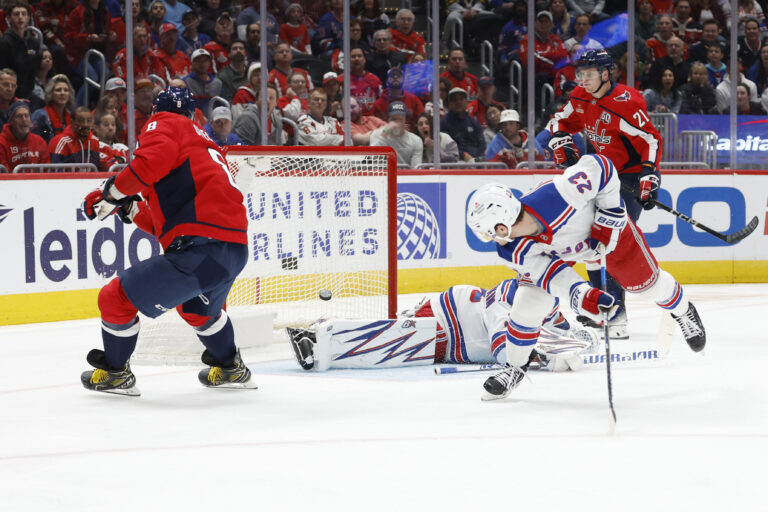Rangers can’t completely mask troubling trends despite fast start to season

The New York Rangers are an impressive 8-2-1 to start the season, after a spirit-lifting 5-2 victory over their rival New York Islanders this past Sunday. With this record looking as strong as it is, it would still be ignorant to think all is smooth sailing for the Rangers, though.
New York’s penalty kill sits at a staggering 92.3 percent, first overall in the NHL. It’s power play is clicking at 28.1 percent, sixth best in the League.
The Rangers are also first in goals against per game (2.18) and fifth averaging 4.00 goals per game. Not surprisingly with those numbers, their plus-20 goal differential is second best in the NHL.
Of course, the Rangers also have a contract extension-seeking goaltender in Igor Shesterkin to thank for this hot start. He touts elite numbers across the board, including a .933 save percentage, good enough for second in the NHL.
This all all terrific stuff. But it all helps mask some troubling trends in the Rangers overall game, too.
There was, after all, a reason why coach Peter Laviolette felt the need to blow up his line combinations and defense pairs against the Islanders.
So, yes, there are underlying problems here.
Related: Peter Laviolette sees swapping defense pairs ‘easiest part’ of Rangers shake up
Causes for Rangers concern during 8-2-1 start

Let’s break down where the Rangers issues are:
Lowly defensive metrics
While these stats look eye-popping and League-topping, what many don’t see is the Rangers lowly expected-goals-against per 60 minutes, which is a concerningly low 2.95. This number puts them among the League’s worst, 28th in this particular area. The only teams expecting to give up more goals every game are the San Jose Sharks, Pittsburgh Penguins, Anaheim Ducks, and Montreal Canadiens. Each was a lottery team just a year ago, and sit outside a playoff spot as it stands today.
The eye test has been bad enough for the Rangers defense, especially recently, though really all season. They’ve countered their defensive issues for the most part, able to win behind Shesterkin, and riding explosive bursts and great special teams play.
But is that sustainable when you’re consistently chasing the game?
Thank Igor

The Rangers can thank Shesterkin for his unbelievable play to this point, stealing several wins and keeping them in games they were being run out of the building on a couple of occasions. Shesterkin’s 2.22 goals-against-average and the team’s 14.2 goals-saved-above-expected are difference makers.
Prior to a 40-shot outing against the injury-riddled Islanders, the Rangers failed to muster more than 20 shots in their previous two games. In recent games, there’s been extended shifts when the Rangers were hemmed in their own zone for minutes at a time, even during the Sunday matinee against the Islanders. You might remember that was their undoing against the Florida Panthers in the Eastern Conference Final last spring.
Shesterkin has faced 30+ shots in six of nine starts. He’s allowed two goals or fewer six times. Simply, he’s been brilliant. And that’s a great part of the equation. Any winning team needs big-time goaltending. But the issue is that the Rangers are relying too much and too often on Shesterkin’s heroics to clean up their mess.
Identity crisis
The Rangers relatively respectable defensive stats on the surface are vastly different than last season. The Presidents’ Trophy winners finished with a praise-worthy 229 goals-against, finishing seventh in the NHL. If you take out Shesterkin’s mid-season struggles in 2023-24 that number is even better. The Rangers managed to finish with such great defensive numbers despite their starting goaltender punching way below his weight-class for much of the season.
This season, Shesterkin is the primary reason why they are keeping the puck out of their net. This leads to a justified questioning of New York’s true identity: The Rangers could be an elite offensive team carried by its goaltender, with terrible defensive play. On the other hand, The Rangers could be a true contender, who can rely on any aspect of their team on any given night to bring them wins, more similar to last season.
It’s a bit of a catch-22. Elite teams typically have elite goaltending. Elite teams usually can rely on top-end special-teams play. It’s part of the formula.
The issues arise when those areas are called on to save the Rangers on a consistent basis. Instead of having all facets in synchronicity, the Rangers rely far too heavily on Shesterkin and special teams — and brief explosions of offense — to win games. A high-end team like the Rangers can make that work in the regular season. But it’s a not a recipe for success in the postseason.
More About:New York Rangers News

